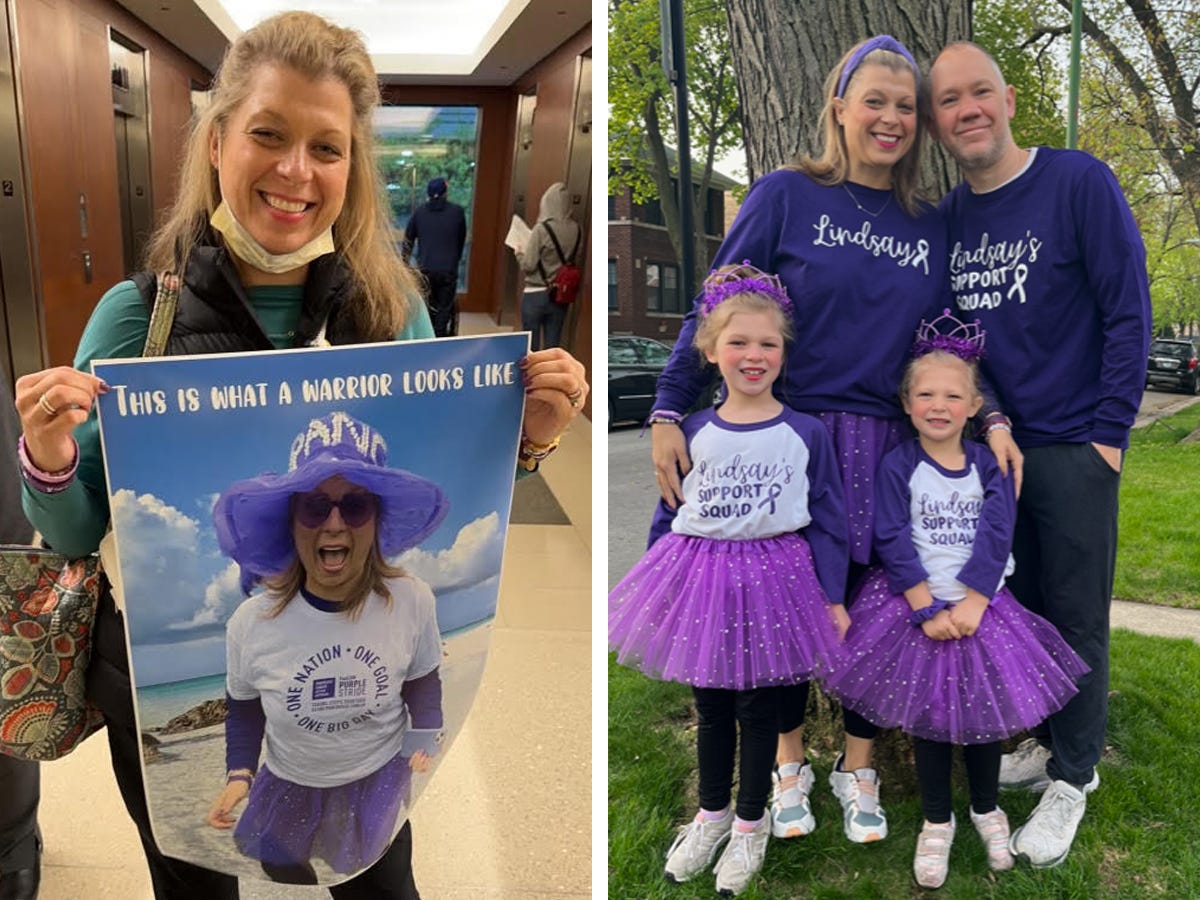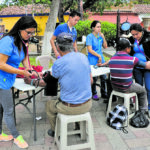Global Courant 2023-05-20 15:24:00
(Left) Lindsay Gavin, who was diagnosed with stage 4 pancreatic cancer at age 40. (Right) Gavin and her family dressed up for the Purple Stride.Lindsay Gavin
Lindsay Gavin, 40, was diagnosed with stage 4 pancreatic cancer after heart palpitations.
Like many patients, she didn’t notice symptoms until the later stages of pancreatic cancer.
Leaning on her network of friends and family has helped her find all possible treatment options.
When Lindsay Gavin ended up in the emergency room on Christmas Eve 2022, the 40-year-old mother of two wasn’t sure what to make of her palpitations. She assumed she had trained too hard Orange Theory The day before. While waiting at the hospital, she developed abdominal cramps and a fever, she told Insider.
After the imaging was completed, she was diagnosed with stage 4 pancreatic cancer, which had spread to her liver. It was a difficult diagnosis: approx 5-10% of pancreatic cancer patients survive the past five years after diagnosis, and those with stage 4 pancreatic cancer have a five-year survival rate of 1%.
Gavin’s younger than most pancreatic cancer patients, who are diagnosed when they are over 55 years old. When she received her diagnosis, she told Insider she felt “utter shock” and immediately thought of her family. “Of course all I’m thinking about is my two little girls and will I be there for them?” she said. “But they are also my ray of hope, so I had to stay strong and do what I had to do.”
She said her seven- and four-year-old daughters were the reason she asked for an antidepressant right away. Then, with the help of her vast network, she began seeking treatment for one of the deadliest cancerswhich causes about 50,000 American deaths each year.
Like many, her pancreatic cancer symptoms appeared in later stages
What makes the pancreas so difficult to diagnose is that most people don’t experience symptoms until stage four, the most advanced stage of the disease.
Gavin, who worked as a nurse before starting treatment, suffered a work-related shoulder injury a month before her diagnosis. She took Tylenol and Motrin “around the clock,” which she suspected masked her fever. When diagnosed with cancer, she had masses in her pancreas and liver, severe diverticulitis (bulging pouches in her digestive tract), and an abscess in her colon that was septic.
Story continues
Her family helps her find all possible treatments
(Left) Gavin with her husband and two daughters; (Right) Gavin with her parents and sister.Lindsay Gavin
Doctors told Gavin that chemotherapy was the best treatment option, but her family was determined to look for all possible treatments, including advanced biotechnology.
Gavin enlisted the help of her sister and retired mother, who immediately dove into the resources raised by the Pancreatic Cancer Action Network.
She has had nine rounds of chemotherapy so far at Northwestern Memorial Hospital, which she said were “very successful” after eight weeks and that at first all of her tumors had shrunk, although some have grown back.
Her family and friends keep her abreast of new advances in pancreatic cancer treatment, such as the recent one development of an mRNA vaccine that prevented the cancer from returning in 50% of the patients who received the shot.
Gavin still can’t bring herself to read too much about pancreatic cancer, making her mother’s and sister’s research useful. “They’re bulldogs when it comes down to it,” she said.
She leans on her huge emotional support network
Gavin’s friends and colleagues cheer her on during her chemotherapy treatments.Lindsay Gavin
Gavin described the support she received as “unreal” – many of her friends and colleagues have shown up for chemo treatments with posters to cheer her on and snacks for the nurses.
“They bring gifts and cards — not a typical ‘I’m so sorry you’re going through this,’ card,” she said. “It’s like, ‘Oh my God, I hate my husband. Listen to what he did to me last night.'” Gavin reads them as she reviews her treatments.
Her network has also expanded since her diagnosis — one of Gavin’s best friends introduced her to a 39-year-old woman in Atlanta who also has late-stage pancreatic cancer.
“We talk almost every day now, which is great,” Gavin said. “She has a great sense of humor. Humor really helped a lot with this whole diagnosis for me.”
To raise money for pancreatic cancer research, Gavin ran the Purple pass in Chicago with over 120 people on her team – and took first place. Her sister also organized a team with her family and friends in Detroit, where Gavin was born and raised. “It was pretty cool to have two top fundraising teams in two different states, for the same cause,” said Gavin.
While the future is unknown, Gavin is hopeful: She has a rare gene mutation that is “amazing” because her doctors said she can try targeted therapy, in which she receives infusions of drugs that target specific proteins on the cancer cells that can kill them. to help. stop growing or even destroy the cancer cells. Although the drugs, Herceptin and Perjeta, are not FDA-approved to treat pancreatic cancer, they have been used to chest And stomach cancer.
In the meantime, she said she has built a new relationship with God and is trying to take things one day at a time. “There is a lot more prayer going on in my life right now and I just lose myself in my friends and my family,” she said. “I really just focus on the small wins.”
Read the original article Insider




